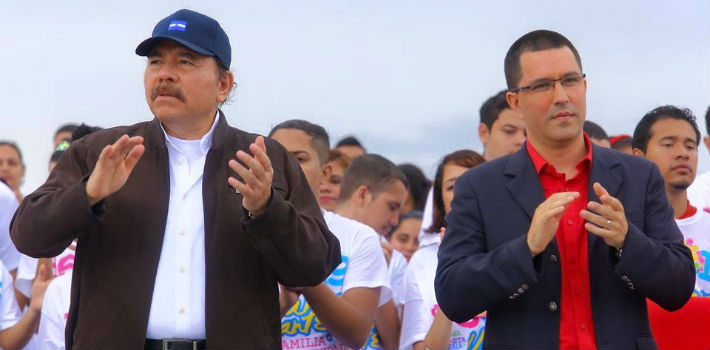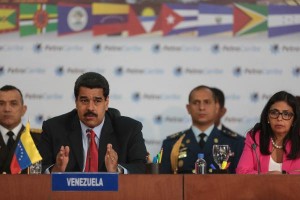
EspañolNicaraguans need not worry, because Venezuela will support them with “anything they need” — at least if visiting Vice President Jorge Arreaza is to be taken at his word.
At a speech on July 19 in Managua, Arreaza called on Nicaraguan youth to “care for and uphold” the current government and reiterated that they can “count on Bolivarian Venezuela” for financial support.
Venezuelan analysts, however, like the economist Luis Oliveros, say the country is not in any position to continue offering foreign aid, given the current economic crisis marked by shortages, inflation, and low production.
Oliveros tells the PanAm Post that the only aid Venezuela can give Nicaragua is more oil, but that would be counterproductive in light of the country’s current situation.
The analyst says Venezuela is already providing thousands of barrels of oil per day to Nicaragua based on the Petrocaribe energy-cooperation agreement, which Nicaragua pays for in part with food. Oliveros says the deal is a poor trade-off, since the oil could be sold in other markets for cash.
“This supposed aid that we will once again give to Nicaragua is nonsense. It is a double standard, and I don’t think Venezuelans will appreciate the idea of providing aid to Nicaragua while our country is experiencing this current situation.”
Furthermore, Oliveros says Nicaragua is currently in better financial standing than Venezuela. According to the economist, Venezuela’s GDP has dropped more than 7 percent, inflation is at over 100 percent, shortages are at 40 percent, and the foreign-exchange deficit is hovering around US$10 billion.
Venezuela Needs Help
Political analyst Elsa Cardozo tells the PanAm Post that “petrodiplomacy” has dominated Venezuela foreign policy over the last 15 years. Although the drop in international oil prices has caused a shift in domestic policy, Cardoza says the Venezuelan government has continued to leverage political support through economic deals that favor other countries.
However, the analyst affirms that Venezuela image internationally has been marred. She says most foreign nations view Venezuela as a “delinquent country that owes a lot of money to international suppliers;a country with the highest inflation in the world, with alarming scarcity rates, persistent citizen insecurity and legal uncertainty, and probably the worst-managed economy in the world.”
According to Cardoza, the government must maintain the necessary rhetoric to garner support from regional allies like Nicaragua, Cuba, Ecuador, Bolivia, and Uruguay, and that is why the government continues to offer more in aid than it can possibly provide.
Petrocaribe: “The Worst Deal in Venezuelan History”
Oliveros says the Petrocaribe agreement has generated cash flow problems for Venezuela totaling over US$50 billion. He says the problem is so grave, Venezuela has had to sell a large portion of its debt in the financial market or negotiate directly with countries like the Dominican Republic or Jamaica, forgiving up to 50 percent of their debt, in order to receive cash payments.
According to Oliveros, the greatest Petrocaribe debtor is Cuba, which receives nearly 100,000 barrels per day, followed by the Dominican Republic and Jamaica.

In terms of how much money is lost when Venezuela provides aid to other countries, the economist says nearly 125,000 barrels per day are dedicated to Petrocaribe agreements. The problem with these agreements, he says, is that a large portion of the bill is paid in kind (sometimes overcharging Venezuela), and the other portion is financed at a 1 percent rate spread over 20 years.
For example, Nicaragua pays Venezuela primarily with agricultural products, including livestock, pasteurized milk, black beans, refined soybean oil, sugar, and raw palm oil. Further, Nicaragua is allowed to pay the rest within a 20 to 25-year window, according to statements from Venezuelan Ambassador Javier Arrúe.
Oliveros says Venezuela should be collecting cash payments rather than extending 20-year credits for oil.
“Petrocaribe is one of the worst deals Venezuela has ever made. It has caused nothing but trouble, because the money that was lost could have helped to get out of the current crisis.”
“Venezuela is the one in need of aid,” he says, adding that this explains why the country has been recently selling off certain assets, such as refineries and debt, while asking for financial help from China and Russia.
 Versión Español
Versión Español












